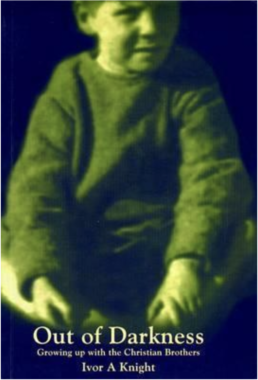These life stories may contain descriptions of childhood trauma and abuse, as well as images, voices and names of people now deceased. If you need help, you can find contact details for some relevant support services on our support page.
Australian writer and prison superintendent, Ivor Knight (1934-2012), was in institutions as a child.
Ivor Knight was the ninth child born into a large Western Australian family. Ivor’s parents married in Fremantle in 1913 and had ten children. His mother, Henrieta, died when Ivor was around two years old. At the age of four, Ivor and three siblings still under the age of sixteen were charged with being ‘neglected’ and made Wards of the State of Western Australia.
Ivor and his two brothers were sent to Castledare, a boy’s school and home run by the Christian Brothers in a suburb of Perth.
There was a lot for the child to get used to. The three boys were separated from each other on arrival and their father rarely visited. Ivor quickly became known as Nitty Knight because of a problem with head lice. He also had to cope with bare feet as the boys were not given any shoes to wear, and schooling was harsh.
At Castledare, I was introduced to the schoolroom for the first time. Mistakes in our work brought an immediate response. A cuff around the ears or the strap on the hands. My handwriting was poor and this usually earned me the strap for blotting or smudging the copy book. When I was sent back to do the work again, my hands would be too painful and numb to do any better. It was a vicious circle (Knight, 19).
Young Ivor was also sexually abused at Castledare by staff. After four years at Castledare, Ivor was sent to Tardun Farm School, also run by the Christian Brothers. It was located in the small town of Tardun, over 400 km north of Perth in the midwest region of Western Australia. The boys were told they would be safer at Tardun because the “war was getting worse.”
…the excitement of the trip diminished the sadness of the departure [from the sisters who visited Castledare] …My previous family life and members were now very indistinct in my memory. Orphanage life was all I knew now (Knight).
There were about one hundred and fifty boys at Tardun and schooling was as harsh there as at Castledare. The boys also had to work on the farm in addition to their domestic duties, such as cleaning and laundry. Ivor was sexually abused by staff at Tardun. He was also beaten for “various infractions, real or imagined” (Knight, 34).
One of Ivor’s fondest memories of being at Tardun was being taken to hospital because of scurvy. He spent five weeks in the hospital, where he was well fed, allowed to play, given toys, and never told off or punished.
In 1945, at the end of WWII, Ivor was sent to Clontarf, another Christian Brothers institution located in Manning, a Perth suburb. At first, they had fun with some of the remaining Australian Air Force personnel who had been stationed there during the war; the men ran “picture shows” for the boys. American servicemen also visited and taught the lads how to play baseball. Ivor’s siblings came to visit and sometimes Ivor was able to visit his sisters in their homes.
Then the sexual abuse started up again and Ivor became increasingly depressed and withdrawn. He was also unduly punished and began plotting a getaway. For a few days, Ivor and friends looked after themselves in the bush, armed with a rifle so they could shoot rabbits. When they were eventually caught and returned to Clontarf, there were more whippings to contend with.
At age sixteen, Ivor Knight was finally free of the Christian Brothers after he was sent out to work for a dairy farmer. Once he was working, the teenager discovered there were decent people around; they might expect hard work, but they also rewarded the work with ample pay and plenty of food.
In 1962, Ivor married Margaret Pimm who he met while working as a station hand. The couple moved to Perth and had three children.
Ivor became involved in the union movement through the encouragement of his father-in-law. In 1968 he joined the Western Australian Prison Service. He studied through the Trade Union Training Authority and made his way up in the Prison Service, until he was posted to Roebourne, a former gold rush town 1563 km north of Perth. Ivor took a job there as temporary Acting Superintendent. He was later appointed permanent Superintendent.
In 1982, Ivor’s marriage dissolved and he enrolled as a mature age student at Murdoch University. The children remained with their father.
Four years later, Ivor was relocated as Superintendent to Fremantle Prison (decommissioned in 1991 and now a World Heritage site). In 1989, he was relocated to Geraldton, a coastal city 424 kilometres north of Perth.
Ivor Knight completed his Bachelor of Arts degree in December 1988 at the age of fifty-four. He ceased work with the Prison Service in 1991. He published Out of Darkness, a memoir of his time with the Christian Brothers, in 1998. Ivor passed away in Armadale, Western Australia in 2012.
References:
“Castledare (1934 – 1983).” Find & Connect, 2021. https://www.findandconnect.gov.au/guide/wa/WE00048
“Clontarf (1901 – 1983).” Find & Connect, 2021. https://www.findandconnect.gov.au/guide/wa/WE00057
“Kenneth Ivor Knight”. Wikitree. https://www.wikitree.com/wiki/Knight-5295
Knight, Ivor A. Out of Darkness. Growing up with the Christian Brothers. Fremantle Arts Centre Press, 1998.
“Tardun Farm School (1928 – 2008).” Find & Connect, 2021. https://www.findandconnect.gov.au/guide/wa/WE00216
Image available here.
